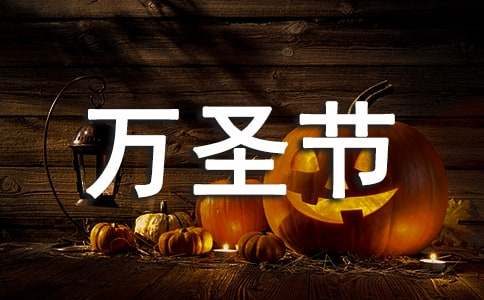- 相关推荐
2016关于万圣节的英语资料大全带翻译
万圣节(All Saints' Day, All Hallow's Day或Hallowmas) 是每年11月1日的欧美大节日。以下是小编带来的关于万圣节的英语资料大全,希望对你有帮助。

Halloween (or Hallowe'en) is an annual holiday observed on October 31, which commonly includes activities such as trick-or-treating, attending costume parties, carving jack-o'-lanterns, bonfires, apple bobbing, visiting haunted attractions, playing pranks, telling scary stories, and watching horror films arevery happy.
Halloween (or Hallowe'en) is an annual holiday observed on October 31, which commonly includes activities such as trick-or-treating, attending costume parties, carving jack-o'-lanterns, bonfires, apple bobbing, visiting haunted attractions, playing pranks, telling scary stories, and watching horror films.
History
Historian Nicholas Rogers, exploring the origins of Halloween, notes that while "some folklorists have detected its origins in the Roman feast of Pomona, the goddess of fruits and seeds, or in the festival of the dead called Parentalia, it is more typically linked to the Celtic festival of Samhain, whose original spelling was Samuin (pronounced sow-an or sow-in)".The name is derived from Old Irish and means roughly "summer's end".Snap-Apple Night (1832) by Daniel Maclise.Depicts apple bobbing and divination games at a Halloween party in Blarney, Ireland.The name 'Halloween' and many of its present-day traditions derive from the Old English era.
The word Halloween is first attested in the 16th century and represents a Scottish variant of the fuller All-Hallows-Even ("evening"), that is, the night before All Hallows Day.[4] Although the phrase All Hallows is found in Old English (ealra hālgena mæssedæg, mass-day of all saints), All-Hallows-Even is itself not attested until 1556.
11月1日 -- 万圣节 All Saints' Day
11月2日 -- 墨西哥的鬼节 Day of Death
万圣节(All Saints' Day, All Hallow's Day或Hallowmas) 是每年11月1日的欧美大节日。
Halloween 是 All Hallows Eve 的缩写,万圣节前夜的意思,指10月31日的晚上。
For thousands of years people have been celebrating different holidays and festivals at the end of October. The Celts celebrated it as Samhain (pronounced “sow-in”, with “sow” rhyming with cow)。 The Irish English dictionary published by the Irish Texts Society defines the word as follows:
“Samhain, All Hallowtide, the feast of the dead in Pagan and Christian times, signalizing the close of harvest and the initiation of the winter season, lasting till May, during which troops (esp. the Fiann) were quartered. Faeries were imagined as particularly active at this season. From it the half year is reckoned. also called Feile Moingfinne (Snow Goddess)。(1) The Scottish Gaelis Dictionary defines it as ”Hallowtide. The Feast of All Soula. Sam + Fuin = end of summer.“(2) Contrary to the information published by many organizations, there is no archaeological or literary evidence to indicate that Samhain was a deity. The Celtic Gods of the dead were Gwynn ap Nudd for the British, and Arawn for the Welsh. The Irish did not have a ”lord of death“ as such.
The Celts believed that every year on the last day of October, the souls of the dead visited the earth.www.
When the Romans conquered the Celts in the first century A.D., they added parts of their festivals, Feralia and Pomona to the tradition. Feralia was a festival to honor the dead and Pomona was a harvest festival named after the goddess of fruit (apples) and trees.
Around the eigth century, the Christian church made November 1 All Saints' Day to honor all of the saints that didn't have a special day of their own. Over the years these festivals combined, the mass held on All Saints' Day was called Allhallowmas (the mass of all Hallows - saintly people)。 The night before was known as All Hallows Eve. Eventually this name became Halloween.
In the 1800s, as a lot of people emigrated to the U.S., the holidays and traditions of different cultures merged. Halloween was not always a happy time. October 31, or the night before took on other names. Some called it Devil's or Hell night, to others it was mischief night. Here in Vermont, the night before is called cabbage night. To some people this became a time to play tricks on others. Some of these tricks were not fun at all. Luckily, community groups and individuals took action and started to change Halloween into a family event. Dressing up in costumes and going ”trick or treating“, costume parades, community parties and Fall festivals are some of the ways that Halloween is celebrated today.
Other countries have different Fall festivals to honor the deceased.
The Festival of the Dead is one of the most important happenings in both Palermo and the rest of Sicily. The second of November is a festival day for the children of Palermo as, according to tradition,they were made to believe that their dead relatives would return the night before and leave them traditional sweets and cakes on the table (Martorana fruit, which is almond paste made into the shape of different fruit)。 They would also receive puppets of boiled sugar and toys. It's one way of keeping the memory of their dead relatives and loved ones alive.
一年中最”闹鬼“的这天夜里,各种妖魔鬼怪、 海盗、 外星来客和巫婆们纷纷出动。在基督纪元以前,凯尔特人在夏未举行仪式感激上苍和太阳的恩惠。
当时的占卜者点燃并施巫术以驱赶据说在四周游荡的妖魔怪。后来,罗马人用果仁和苹果来庆祝的丰收节与凯尔特人的10月31日溶合了。
在中世纪,人们穿上动物造型的服饰、 戴上可怕的面具是想在万圣节前夜驱赶黑夜中的鬼怪。尽管後来基督教代替了凯尔特和罗马的宗教活动,早期的习俗还是保留下来了。现在,孩子们带着开玩笑的心理穿戴上各种服饰和面具参加万圣节舞会,这些舞会四周的墙上往往悬挂着用纸糊的巫婆、 黑猫、 鬼怪和尸骨,窗前和门口则吊着龇牙裂嘴或是面目可憎的南瓜灯笼。孩子们还常常试图咬住悬挂着的苹果。
美国和加拿大的孩子们在这天穿戴上古怪的服饰去按邻居家的门铃,并按传统发出”是款待我还是要我耍花招“的威胁。邻居们不管是否被吓着,总是准备了一些糖果、 苹果等点心,孩子们则一一收入自己的袋内。
万圣节其实不是基督教的节日。2500年前,爱尔兰的凯尔特人(Celts)以10月31日为一年的最後一日,11月1日是新一年的开始,也象徵冬天的来临。
凯尔特人相信死亡之神Samhain在10月31日的晚上会和鬼魂一起重返人间,寻找替身。因此他们燃点火炬,焚烧动物以作为死亡之神的献礼。还会用动物的头或皮毛做成的服饰打扮自己,发出古怪的声音,使死亡之神认不出自己,避过灾难。这就是今天万圣节化妆舞会的由来。过了当晚,鬼魂回到阴间,一切回复平静。
基督教兴起,教徒沿袭万圣节传统,万圣节的意义慢慢改为纪念为献身於神而死亡的人(holies)。
附带一提,11月2日是墨西哥的鬼节(Los Dias de los Muertos, Day of the Dead)。当天家家户户都烘烤动物造型的面包和煮鸡肉等食物,并在供桌上面放置玩具,以期待早逝的孩童们回到家中玩耍。也可以陈列鲜花、 水果、 照片和彩绘的骷髅头,接待仙逝长辈。
墨西哥人认为,鬼魂和人一样需要及时行乐,所以鬼节宛若一场嘉年华会,人们带着面具到处游走,吃骷髅形状的糖,面包上还装饰有鬼的形像。黄昏时刻,全家人一起到墓园清理墓地,妇女们或跪或坐整夜祈祷,男人们交谈或唱歌,在子夜中烛光忽闪忽灭充满了整个墓园,游唱歌者为已逝亡者的灵魂高歌吟唱。
【万圣节的英语资料带翻译】相关文章:
万圣节的英语作文(带翻译)07-30
万圣节英语介绍作文(带翻译)01-28
2015万圣节的英语作文带翻译01-28
关于万圣节的英语日记带翻译01-28
关于万圣节的英语作文带翻译01-28
2016初中万圣节英语作文带翻译10-18
2016关于万圣节的英语作文带翻译10-18
英语作文带翻译精选10-06
★英语日记带翻译07-14